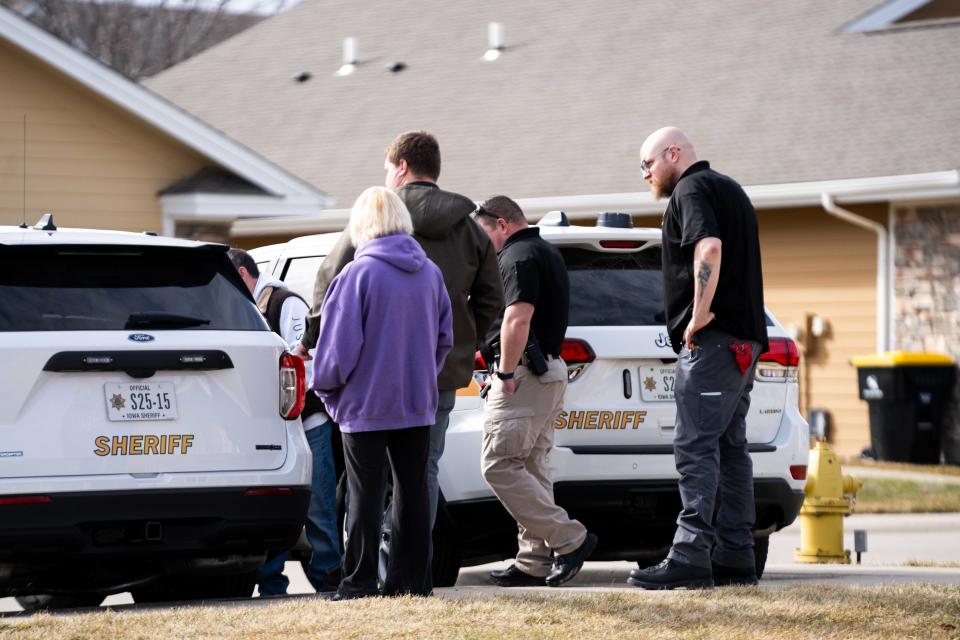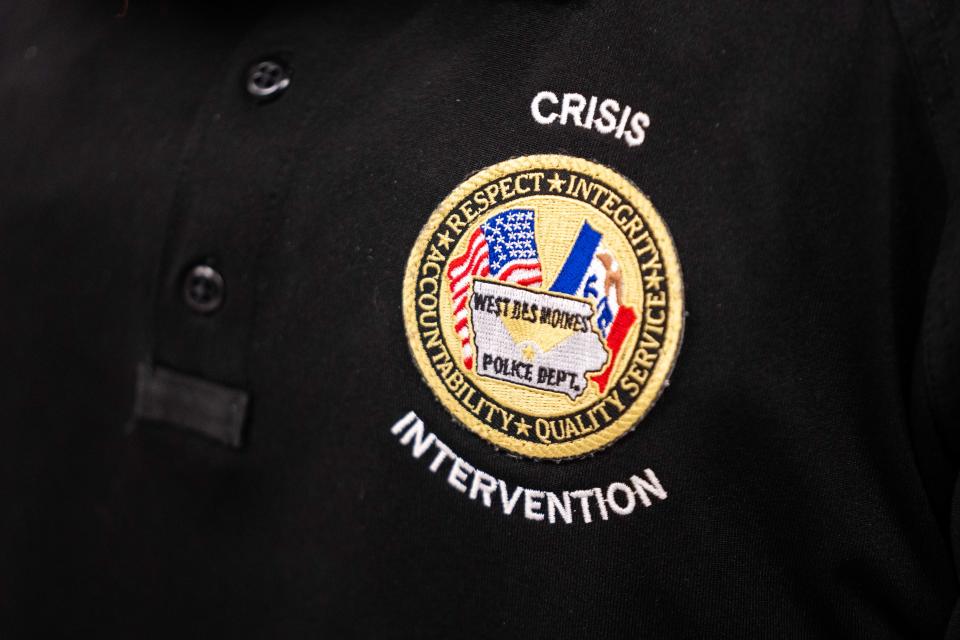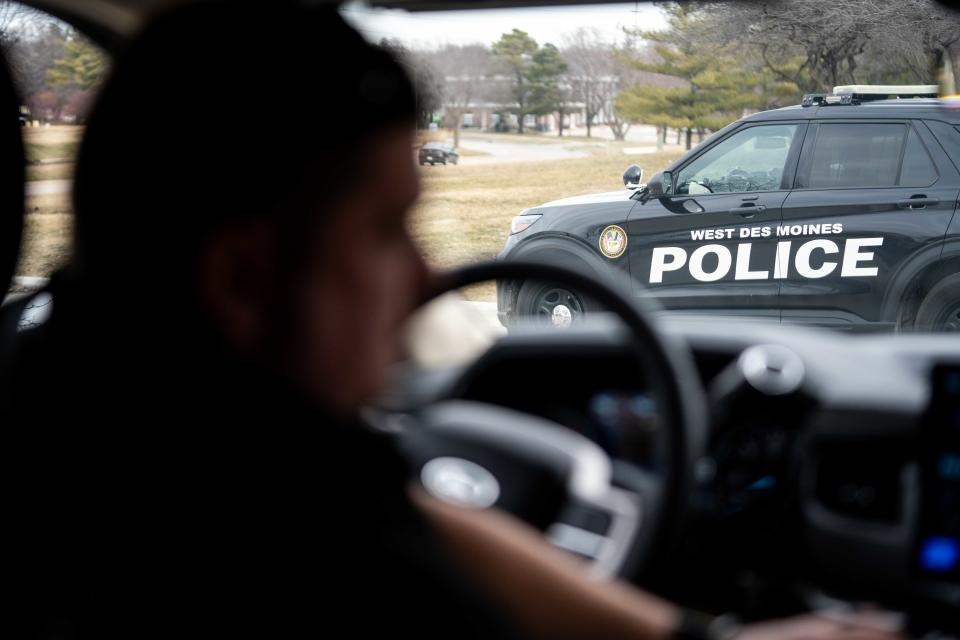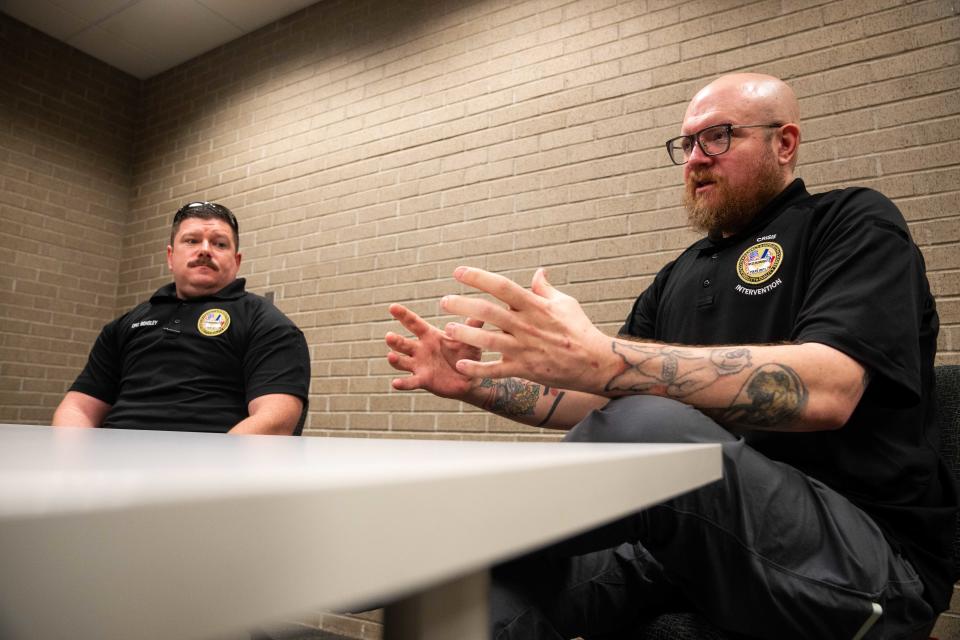Program that links mental health services with police uncertain under Reynolds' overhaul
- Oops!Something went wrong.Please try again later.
On a Wednesday morning in late February, Kenneth Bensley and T.J. Wood rushed to a subdivision in Waukee. As West Des Moines Police Department's co-responder team, responding Dallas County officers hoped the pair could help a man facing eviction find mental health services.
On the drive to the home in Waukee, Bensley, a longtime suburban police officer, and Wood, a crisis interventionist, sifted through the details. County deputies said they found a man barricaded inside a home that he was supposed to have already vacated.
They said they believed they heard gunshots coming from inside the home and set up a perimeter, and eventually got the man out and off the property.
Bensley said officers recognized the man was in crisis and needed help — not jail — and thought to call on them for additional help.

"The client defines the crisis. We just kind of meet them where they're at," Wood said. "Sometimes, it's just us talking through the situation with them or just listening. Some people just need an ear. Other times, people need guidance to get to a crisis center, or hospital, or get themselves into rehab."
Bensley and Wood make up a handful of Heart of Iowa Community Services' co-responder teams, a program that in recent years has diverted hundreds of people in crisis from jail and referred them to the proper resources.
That same program — which Heart of Iowa plans to expand to rural cities such as Pella and Knoxville — now faces uncertainty as lawmakers consider Gov. Kim Reynolds' proposal to overhaul the state's mental health and disability services.
Both House and Senate versions of the legislation have passed committee votes and are awaiting debate.
Gov. Reynolds' proposal would consolidate services into 7 districts
Darci Alt, Heart of Iowa's CEO, is among several mental health advocates who have voiced concerns over the governor's proposal, which seeks to revamp mental health and substance use treatment services in Iowa by establishing a Behavioral Health Service System.
State officials have said the new system is meant to create equitable access for Iowans and would be comprised of seven "unified districts." The new districts would combine the state's 32 local regions, which include 13 Mental Health and Disability Service regions and 19 Integrated Provider Networks that oversee substance use and problem gambling services.
More: Kim Reynolds has released her plan to restructure Iowa's mental health systems. Here's what it says:
“Twenty-five percent of adults with serious mental health challenges also suffer from substance use disorder," Reynolds said in a statement last month. "But right now, the system is fractured — preventing Iowans from getting the support they need. By aligning these 32 separate regions into a unified seven, we can improve coordination of services and deliver better treatment for Iowans.”
The new bill directs the Iowa Department of Health and Human Services to hire an administrative services organization, or ASO, to oversee each of the seven districts and its service array. HHS would be tasked with maintaining a central data repository to track the new system and its impacts, and to use that data to track behavioral health needs, develop policies and "otherwise perform acts as necessary to enhance the state's overall behavioral health."
State leaders said they plan to determine the details of the system's day-to-day functionality in the coming months. The system is expected to be fully operational by July, 1, 2025.

'We are stabilizing' people who need care, CEO says
While Alt said she favored parts of the proposal, she is also worried about what it could mean for her agency, which is one of the 13 MHDS regions and supports residents in Audubon, Dallas and Guthrie counties.
She said she worries about whether programs such as the co-responder team would fit the system's new requirements or how the system would impact funding. She said she wants to know how the new system would impact organizations like hers that have already done the work to reshape and grow their services.
"That's where we panic a little bit with the state trying to switch up what we're doing out here because we're doing it," Alt said. "We have data that shows that we are diverting people from hospital beds.
"We are getting people triaged in the community. We are stabilizing them in the community."
More: Rural Iowa has a mental health care crisis, and school superintendents want more help
Apart from West Des Moines, suburban Waukee, Clive and Urbandale police departments also have co-responder teams. The teams pair police officers and mental health professionals dedicated to answering calls involving people in crisis and offer their immediate, direct services.
The model is slightly different from mobile crisis services which are usually led by mental health professionals. Patrol officers are likely dispatched first before mental health professionals are brought to the scene.
Heart of Iowa and Inside Out Wellness & Advocacy, a partnered mental health service and provider, established the first team in 2022 in Waukee and later in the neighboring cities.

Chris Kickbush, who helps lead Waukee's co-responder team as a crisis intervention officer, said he sees value in the model focused on understanding and prioritizing people's health and needs. Kickbush, who completed required training to join the new team, explained that patrol officers answering calls involving people in crisis may be unaware of how to help or what resources to relay.
Before the co-responder team, Kickbush reflected on his role as a patrol officer and was unsure of what services to dole out for people in need. But "once I got this role, it just kind of flipped the script," he said.
Teams also spend time following up with people in crisis
Since last May, West Des Moines' first co-responder team has fielded hundreds of calls, spending approximately 21,357 minutes — or about 356 hours — working closely with people and linking them to services, according to police data.
Wood said a majority of the calls — about 75% — involve people across racial and economic lines struggling with alcoholism.
Police data also showed the team has spent exactly 11,111 minutes — or about 185 hours — following up with individuals to offer more assistance.
Bensley and Wood said their follow-ups run the gamut: Some calls are met with what may seem like an endless phone trill while others spur into weekly check-ins or regular conversations.
"I've worked in human services going on six years now," Wood said. "The one thing that's a constant uphill battle is just people feeling like the problems they have aren't something worth looking at, or they've grown up with families like mine that paid no attention to mental health or (saw it) as a sign of weakness."

Bensley said other individuals have asked him or Wood to reach out more frequently as a way to help hold them accountable or remind them they're not alone. Bensley said he and Wood do care, which is why they give people who didn't answer their calls the first few times a few more chances. Wood added the team's work not only involves them but at times extends to supporting their families and friends as well.
Bensley and Wood said they consider the co-responder model so far successful and view it as vital in combating the stigma around mental health on a community level. Alt said the teams have bridged the gap between law enforcement officers, mental health advocates and people in need of help.
"I would say the positive impact that these programs have had in the communities where they are currently located has far surpassed anything we could have imagined. I am so very thankful for the agencies that stepped up to provide this program," Alt said. "It has certainly been a catalyst."
Reporter Michaela Ramm contributed to this story.
F. Amanda Tugade covers social justice issues for the Des Moines Register. Email her at ftugade@dmreg.com or follow her on Twitter @writefelissa.
This article originally appeared on Des Moines Register: Reynolds' bill could jeopardize program linking mental health, police

